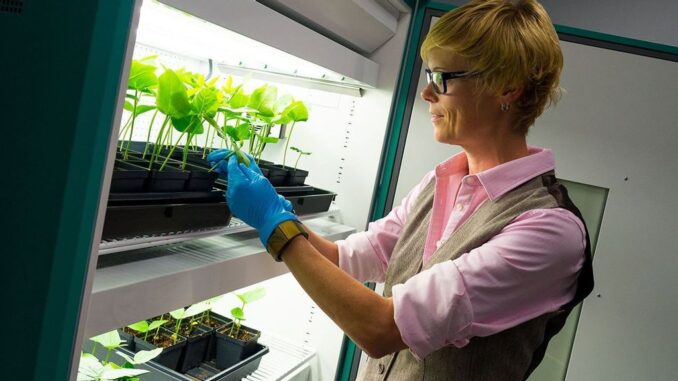
A virus that infects black-eyed pea plants might one day be used to treat deadly metastatic cancer in the lungs if promising research proves conclusive.
A paper published Sept. 14 in the journal Advanced Science indicates that when researchers injected the cowpea mosaic virus, which is harmless to humans and animals, the body registered it as an invader. This triggered an immune response that could make it more effective at fighting cancer.
“For our immunotherapy to work in the setting of lung metastasis, we need to target our nanoparticles to the lung,” said researcher and study co-author Nicole Steinmetz. “Therefore, we created these plant virus nanoparticles to home in on the lungs by making use of S100A9 as the target protein. Within the lung, the nanoparticles recruit immune cells so that the tumors don’t take.”
Steinmetz also teaches nanoengineering and heads the Center for Nano-ImmunoEngineering at UC-San Diego.

Researchers found that the innovative treatment slowed tumor growth in the lungs of mice with either metastatic breast cancer or melanoma and prevented or drastically minimized the spread of these cancers to the lungs of healthy mice that were exposed to the disease.
The treatment is envisioned for patients after they have had a cancerous tumor removed. “It wouldn’t be meant as an injection that’s given to everyone to prevent lung tumors. Rather, it would be given to patients who are at high risk of their tumors growing back as a metastatic disease, which often manifests in the lung. This would offer their lungs protection against cancer metastasis,” Steinmetz said.
To engage the immune response, researchers engineered nanoparticles made from the cowpea mosaic virus to target S100A9, a protein secreted by immune cells that combats infection in the lungs. Steinmetz’s team also targeted this protein because its over-expression plays a role in the growth and spread of tumors.
“Because these nanoparticles tend to localize in the lungs, they can change the tumor microenvironment there to become more adept at fighting off cancer — not just established tumors, but future tumors as well,” said study co-author Eric Chung.
After growing black-eyed pea plants in the lab, the researchers infected them with cowpea mosaic virus and harvested the virus in the form of ball-shaped nanoparticles. These were then attached S100A9-targeting molecules to the surfaces of the particles.

Researchers tested both treatment and prevention. To test treatment, mice with a metastatic tumor in their lungs were treated with nanoparticles and exhibited smaller lung tumors and survived longer than untreated mice.
To test prevention, healthy mice were injected with the nanoparticle virus then later injected with either breast cancer or melanoma cells. The mice that were given the nanoparticle showed a dramatically lower rate of cancer spread to their lungs.
The results showed the researchers the remarkable efficacy of the nanoparticles made from the cowpea mosaic virus in fighting extremely aggressive cancer cells.
“So any change in survival or lung metastasis is pretty striking,” Chung said.
The researchers expect to further study aspects of pharmacology and immunotoxicity, as well as combining other treatments such as chemotherapy, radiation therapy and drugs.
Edited by Richard Pretorius and Kristen Butler
The post Easy-Peasy Cancer Treatment: Legume Virus Could Protect Lungs, Research Shows appeared first on Zenger News.
